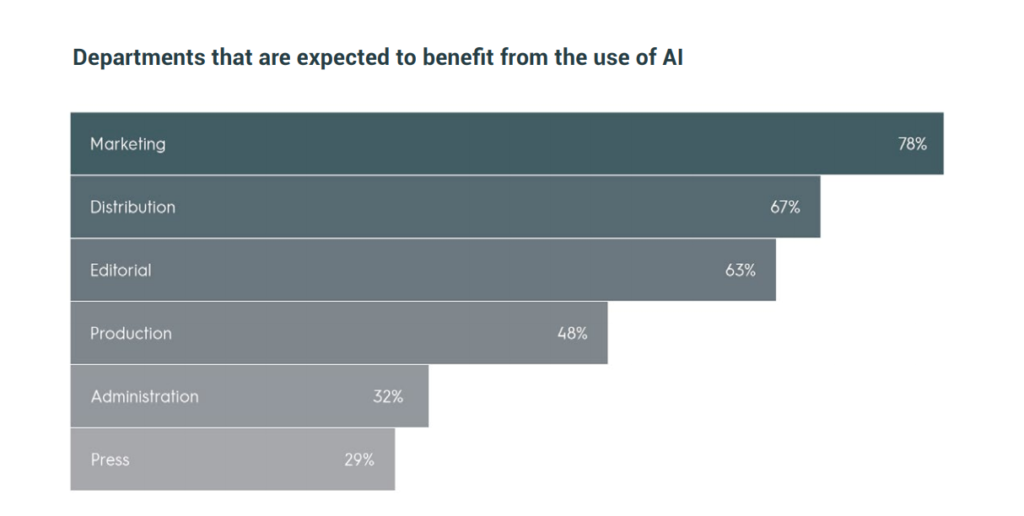As seen in previous blog posts, the pandemic had major disrupting effects on the publishing industry. Remote working, lockdowns, and safety restrictions have changed the editorial process and have also made day-to-day news production more complex. With a general shift towards the digital world, the media industry is undergoing a huge transformation; from constantly evolving technology and changes in readers’ behavior to new delivery channels for news.
In order to stay relevant and competent, publishers have to understand their audience better and evolve their digital experiences to meet their expectations.
Can technologies and innovations like Artificial Intelligence (AI) and Blockchain prove to be helpful in achieving these goals?
Artificial Intelligence
In the media industry, the pandemic has accelerated a number of changes, with publishers transitioning to cloud-based solutions and making greater use of AI technologies. As seen in the ‘The Future Impact of Artificial Intelligence on The Publishing Industry Research’, publishing companies recognize AI as a valuable tool that is implemented in several departments. In fact, marketing and distribution hold the first place, then both editorial and production teams follow. As mentioned within the report, ‘AI gives opportunities to improve and speed up different processes, manage editorial workflow, and improve promotion strategies’.

However, how does AI exactly help publishers?
AI has the potential to transform the publishing industry, ‘an industry that is under enormous pressure to stay relevant with consumers and to deliver results for advertisers and partners’.
Here are some examples of Artificial Intelligence’s role in the publishing industry:
- Content Personalization: AI helps with transitioning to smart content curation, which means providing tailored content to each individual based on their preferences
- Automated text analysis: publishers can detect plagiarized content without human input and monitor copyright infringement on third-party publishing platforms
- Professional translation automation tools: publishers can speed up the time-to-produce translated content and remove the risk of human error
- Improving content’s discoverability with the use of metadata tagging: automating content classification can save a lot of time
- Simplifying processes like editing, formation, and grammar checks: publishers have more time to focus on important tasks, for example, research for higher quality content
- Improving SEO: AI can take over actions like keyword search, performance optimization, and distribution
- E-mail marketing strategies: AI can help with personalizing emails. According to ‘The State of AI-Powered Email Marketing Report’, the average open rate for static emails in the publishing industry is around 19.24%, while for personalized emails 63.22%

Here are three successful examples of AI use in publishing:
- Forbes uses an artificially intelligent publishing platform designed specifically for its newsroom, expert contributors, and partners, that among others provides them with real-time trending topics to cover, recommends ways to make headlines more compelling, and suggests relevant imagery.
- The Washington Post has released an in-house automated storytelling technology created for hyperlocal coverage, that can generate entire articles from quantitative data and enable them to cover all Washington, D.C. area high school football games every week.
- Bloomberg uses a solution that helps with content creation and management and is able to generate thousands of articles about company earnings reports at the end of each quarter.
Blockchain Technology
Blockchain is another major disruptor of the media industry, creating new business models. In fact, the popularity of the technology behind cryptocurrency is such that the global blockchain media industry has been predicted to reach USD 1.54 billion by 2024. Let’s see how Blockchain can bring exciting opportunities for publishers.
Let’s see how Blockchain can bring exciting opportunities for publishers.
What exactly is blockchain technology? Simon Pierre-Marion, CEO and founder of Scenarex, explained it on point in an interview: ‘“It’s like a big book where you store all of the information from transactions that are happening. (…) So it’s, in fact, a database, which is a system where you store data. (…) where you store information. The interesting aspect, though, of blockchain is that you cannot modify it, it cannot be tampered with. So as when you record a transaction in a blockchain, it’s there forever. It cannot be hacked or changed or deleted. It’s there.”
However, in the world of online newspapers, magazines and ebooks, blockchain doesn’t solely relate to paying for online content; it can be furthermore used to ensure that a given transaction is assigned to a specific user.

In specific, there are two main directions in which Blockchain can revolutionize publishing. It can provide:
- Better payment options for content creators
As blockchain technology reduces the need for a middleman during online payments, writers, photographers, or editors can benefit more financially. At the same time, there is the possibility to create ‘smart contracts’, which automatically release payments, whenever publishers accept the content.
2. Assistance with digital property management
Blockchain can be a catalyst for the digital publishing platforms’ popularity by providing intellectual property rights, as readers cannot sell or even share the publication with someone else.
Furthermore, Blockchain can help publishers:
- Detect and prevent unauthorized sharing
- Retain a particular set of rights, and adjust them specifically to maximize potential revenue from their existing deals
- Achieve better collaboration, as they can oversee all workflows in real-time
- Improve their digital advertising, as they can provide an incentive for interaction with their content to their audience (direct compensation)
What does the future hold?
One thing we can say for sure, automation has already had a real impact on improving content creation, distribution, and consumption and it is significant for future newsrooms.
While publishers are understandably cautious about getting involved with technologies like AI and Blockchain, knowing what they are and how they work even at a high level, will help them become more proactive and receptive to these technologies, and ultimately, lead them to a better chance of growth and diversification for the years to come.
This is the time for publishers to begin exploring blockchain, whether that means joining a social network or opening a crypto wallet. These are small steps toward exploring this emerging, disruptive technology that could lead to big outcomes.’
INMA’s Blockchain report
Check also:
- Journalism, media & technology predictions for 2022: 9 trends publishers need to know about
- Four digital trends reshaping the media industry
- The role of AI in the publishing industry
- Blockchain, an intersection of publishing and technology
- Blockchain In Publishing: 8 Possible Use Cases
- Copyright Protection, Smart Contracts, Digital Scarcity And NFTs For Authors. Blockchain For The Publishing Industry With Simon-Pierre Marion






